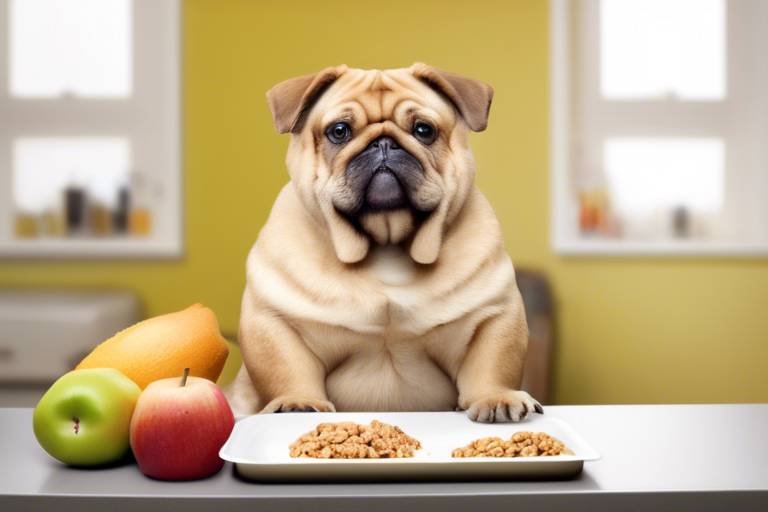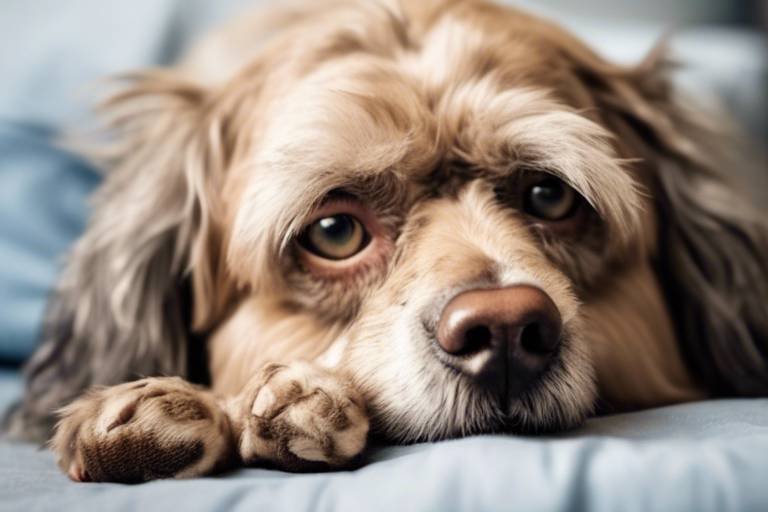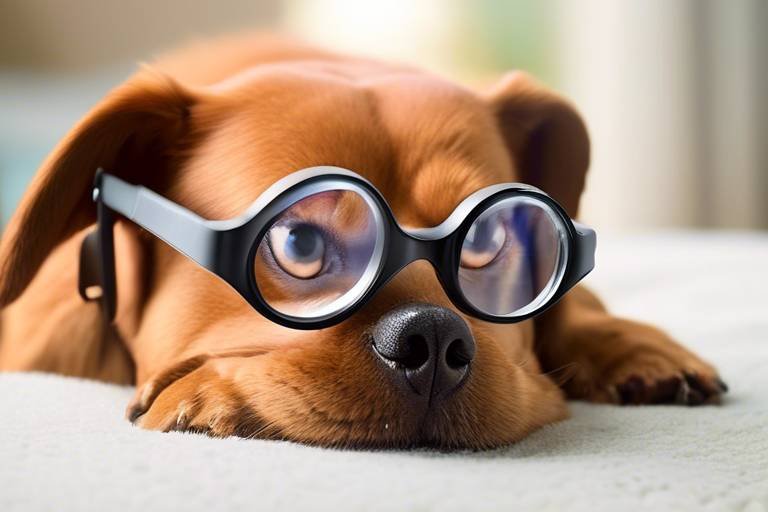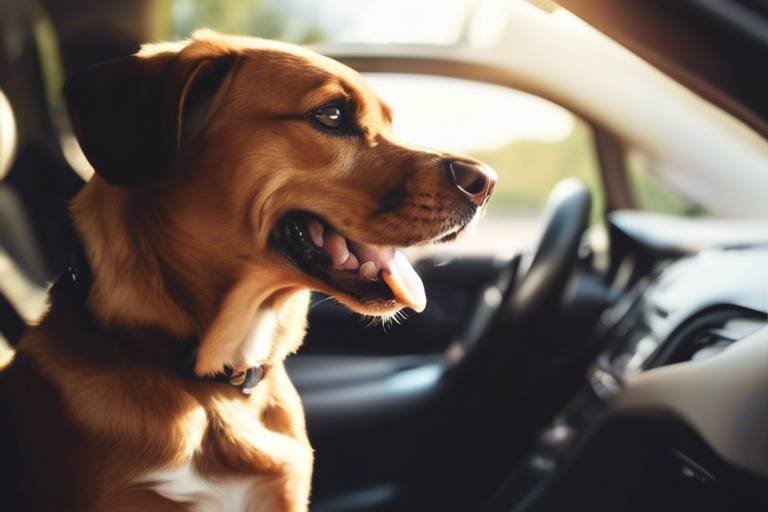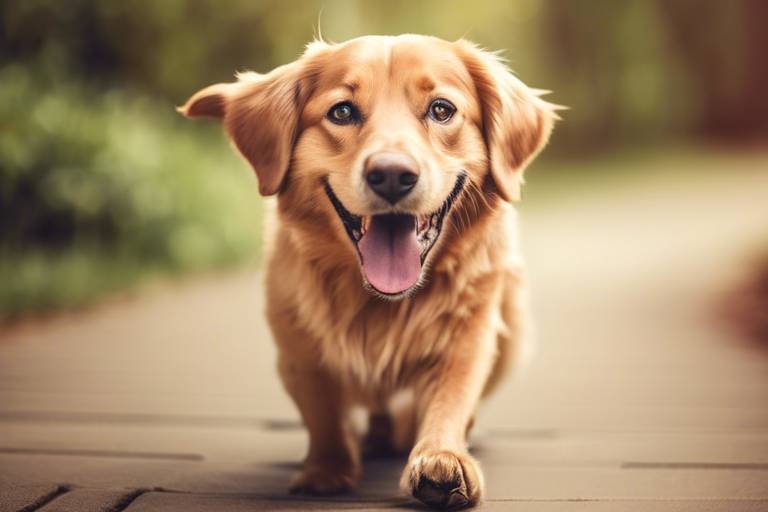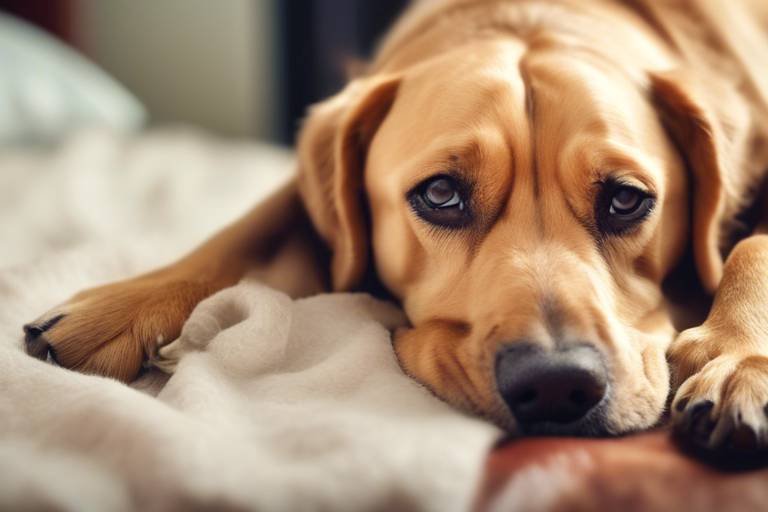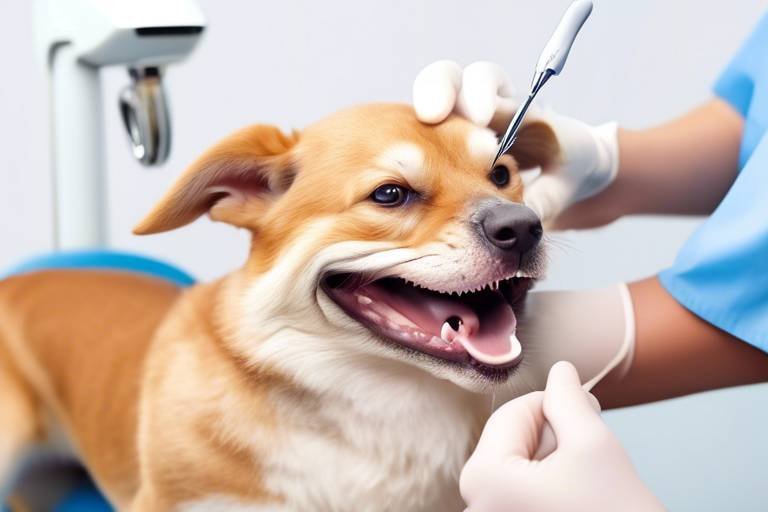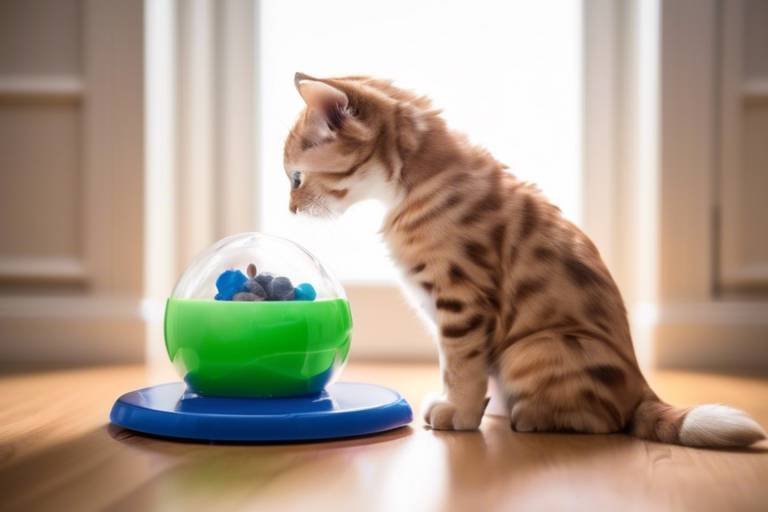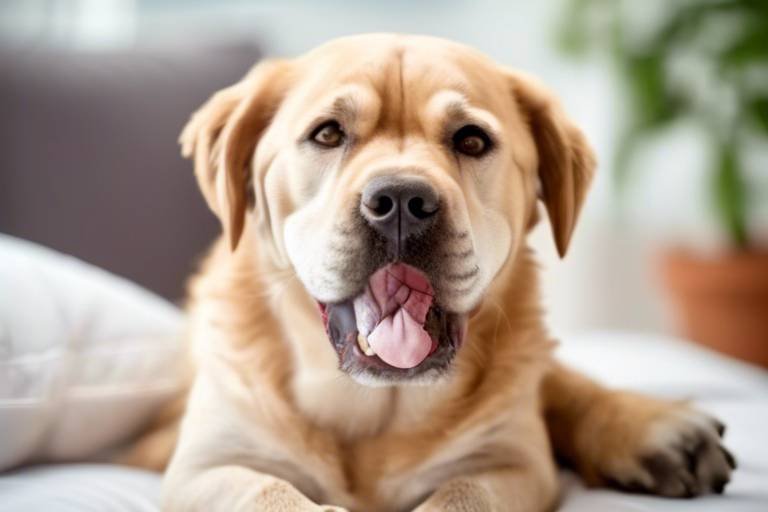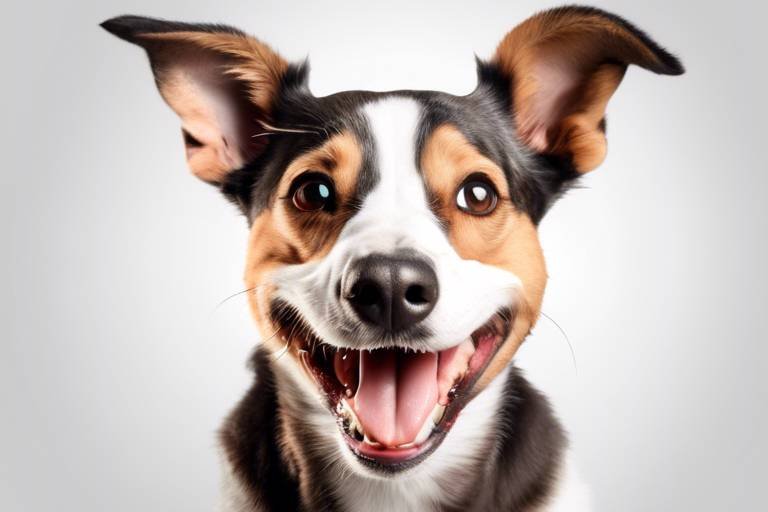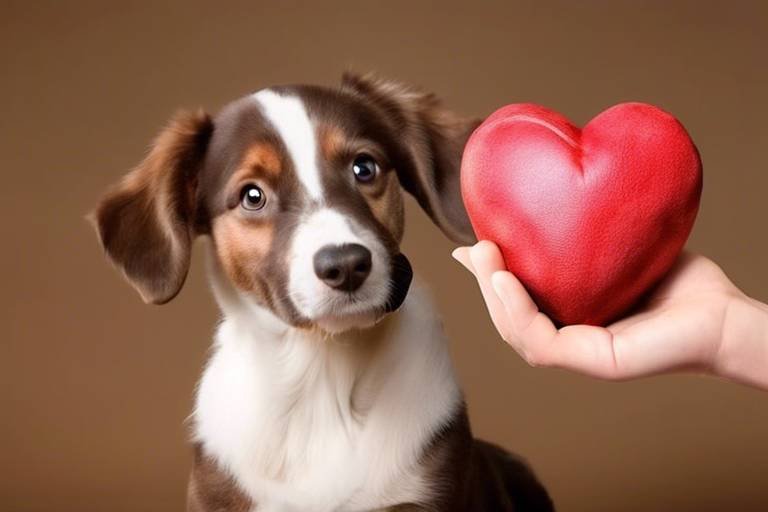How to Keep Your Pet's Eyes Healthy
As pet owners, we often focus on the big things—like what to feed our furry friends or how much exercise they need. But have you ever stopped to think about your pet's eyes? Just like us, our pets can suffer from a variety of eye problems that can lead to discomfort or even serious health issues if left untreated. Keeping your pet's eyes healthy is crucial, and it's easier than you might think! In this article, we'll explore essential tips and practices to ensure your pet's eye health, covering common issues, preventive care, and the importance of regular veterinary check-ups.
First things first—let's talk about some of the most frequent eye issues that affect pets. Understanding these conditions can help you identify symptoms early, which is vital for effective treatment. Some common eye problems include:
- Cataracts: These can cause cloudiness and affect your pet's vision.
- Conjunctivitis: Often referred to as "pink eye," this condition can lead to redness and discharge.
- Glaucoma: Increased pressure in the eye can lead to pain and vision loss.
By being aware of these conditions, you can take proactive steps to keep your pet's eyes in tip-top shape.
Recognizing the signs of potential eye problems in your pets is crucial. Some symptoms to watch for include:
- Excessive tearing
- Squinting
- Changes in eye color
Each of these signs can indicate underlying issues that need attention. Let’s dive deeper into some specific symptoms.
Excessive tearing can indicate underlying issues. If you notice your pet's eyes watering more than usual, it’s time to investigate. Possible causes for this symptom include:
- Environmental Factors: Dust, pollen, and other irritants can cause tearing. Keeping your pet's environment clean can help minimize these irritants. For example, regular vacuuming and using air purifiers can make a significant difference.
- Infections and Allergies: Both infections and allergies can lead to excessive tearing. If your pet's tearing is accompanied by redness or swelling, it might be an infection. On the other hand, if you notice sneezing or itching, allergies could be the culprit.
In either case, it’s essential to consult with your veterinarian for proper diagnosis and treatment.
Environmental irritants like dust or pollen can lead to tearing. To minimize these irritants, consider the following tips:
- Keep your home clean and free from dust.
- Limit outdoor exposure during high pollen seasons.
- Use hypoallergenic products when possible.
Infections and allergies can cause tearing. Differentiating between the two is crucial. If your pet is experiencing excessive tearing along with other symptoms like redness or swelling, it’s a good idea to seek veterinary advice. The vet can perform tests to determine the cause and recommend appropriate treatment.
Squinting can signal discomfort or pain. If your pet is squinting, it could be due to a foreign object in the eye, an injury, or even a more serious condition like glaucoma. It’s essential to seek veterinary advice if your pet exhibits this behavior, as timely intervention can prevent further complications.
Preventive care is essential for maintaining your pet's eye health. Regular check-ups with your veterinarian can help catch any potential issues early. Additionally, here are some practical tips to keep your pet's eyes healthy:
Keeping your pet's eyes clean is vital. Use a soft, damp cloth to gently wipe away any discharge or debris. This simple act can prevent infections and keep your pet comfortable. Remember to use separate cloths for each eye to avoid cross-contamination.
A balanced diet contributes significantly to eye health. Nutrients like Omega-3 fatty acids, Vitamin A, and Antioxidants are essential for maintaining good vision. Incorporating foods rich in these nutrients into your pet's meals can make a world of difference. Here are some pet-friendly foods that are great for eye health:
| Food | Nutrient |
|---|---|
| Carrots | Vitamin A |
| Fish | Omega-3 fatty acids |
| Blueberries | Antioxidants |
Knowing when to seek veterinary care is crucial for your pet's eye health. If you notice any of the following scenarios, don’t hesitate to make an appointment:
- Persistent squinting or tearing
- Redness or swelling around the eyes
- Changes in your pet’s behavior, such as increased irritability or reluctance to play
Early intervention can save your pet from unnecessary pain and complications.
Q: How often should I check my pet's eyes?
A: It's a good idea to check your pet's eyes daily for any signs of redness, tearing, or discharge.
Q: Can I use human eye drops on my pet?
A: No, you should never use human eye drops on your pet without consulting your veterinarian.
Q: What should I do if I see something in my pet's eye?
A: If you notice a foreign object in your pet's eye, do not attempt to remove it yourself. Contact your veterinarian immediately.

Understanding Common Eye Problems
When it comes to our furry friends, their eyes are windows to their health. Just like us, pets can suffer from a variety of eye problems that can lead to discomfort or even serious complications if left untreated. Understanding these common issues is vital for any pet owner. Let's dive into some of the most frequent eye problems that affect our beloved companions, including cataracts, conjunctivitis, and glaucoma. Knowing how to identify their symptoms early can make a world of difference in the effectiveness of treatment.
Cataracts are one of the most common eye issues in older pets. They occur when the lens of the eye becomes cloudy, leading to vision impairment. You might notice your pet bumping into things or hesitating to jump off furniture. If you suspect cataracts, don’t wait—schedule a veterinary appointment to discuss treatment options.
Next up, we have conjunctivitis, or inflammation of the outer membrane of the eyeball and the inner eyelid. This can be caused by infections, allergies, or irritants in the environment. Symptoms to watch for include redness, swelling, and discharge from the eyes. If your pet is pawing at their face or squinting, it’s a good idea to consult your vet.
Then there’s glaucoma, a serious condition characterized by increased pressure within the eye. This can lead to severe pain and even blindness if not treated promptly. Signs of glaucoma in pets include excessive tearing, squinting, and a cloudy appearance to the eye. If you notice any of these symptoms, don’t hesitate to get your pet checked out.
It’s essential to be proactive about your pet’s eye health. Regular check-ups with your veterinarian can help catch these issues early, ensuring your furry friend maintains a good quality of life. In addition to regular vet visits, being observant about your pet’s behavior and eye appearance can provide valuable insights into their eye health.
In summary, keeping an eye out for these common issues—cataracts, conjunctivitis, and glaucoma—can help you take the necessary steps to protect your pet’s vision. Remember, early detection is key!

Signs Your Pet May Have Eye Issues
Identifying eye problems in pets is crucial for their overall health and well-being. Just like humans, our furry friends can experience a variety of eye issues that, if left untreated, can lead to serious complications. So, how do you know if your pet is facing eye troubles? Here are some common signs to watch for, which can serve as red flags indicating that a visit to the veterinarian might be necessary.
One of the most noticeable signs is excessive tearing. If you find that your pet's eyes are watering more than usual, it could be a sign of an underlying issue. This symptom can stem from various causes, including environmental irritants, infections, or allergies. For instance, if your pet is exposed to dust or pollen, they might start to tear up as a natural response. It's essential to monitor how often this occurs, as frequent tearing can lead to further complications if not addressed.
Another warning sign is squinting. If your pet is frequently squinting or keeping their eyes partially closed, it may indicate discomfort or pain. This behavior can be due to several factors, such as an injury, infection, or even a foreign object lodged in the eye. It's important to take this seriously; if your pet is exhibiting such behavior, seeking veterinary advice is recommended. Remember, our pets can't tell us when something is wrong, so we need to be their voice.
Changes in eye color can also signal potential problems. If you notice that your pet's eyes are becoming red or cloudy, this could be a sign of conditions like cataracts or conjunctivitis. Pay attention to the overall appearance of your pet's eyes; healthy eyes should be bright and clear. Any noticeable changes should prompt you to consult your veterinarian for a thorough examination.
In addition to these signs, discharge from the eyes can be another indicator of eye issues. Whether it's a clear, watery discharge or something more concerning like pus, any abnormal discharge should be evaluated. It's helpful to keep track of the color and consistency of the discharge, as this information can assist your vet in diagnosing the problem.
Lastly, if your pet is exhibiting signs of behavioral changes, such as increased irritation or reluctance to engage in activities they usually enjoy, it could be linked to eye discomfort. Pets may become more withdrawn or irritable when they are experiencing pain or discomfort in their eyes. Observing these behavioral changes can help you determine if a vet visit is warranted.
In summary, being vigilant about your pet's eye health is essential. Regularly check for symptoms like excessive tearing, squinting, changes in eye color, abnormal discharge, and any behavioral changes. Recognizing these signs early can make a significant difference in your pet's health and quality of life. If you ever have any doubts or concerns, don’t hesitate to reach out to your veterinarian—they're there to help!
- What should I do if I notice excessive tearing in my pet?
It's best to consult your veterinarian to determine the cause and appropriate treatment. - How often should I check my pet's eyes?
Regular checks should be part of your routine, ideally every week or whenever you groom them. - Can I use human eye drops on my pet?
No, you should never use human eye drops on pets without veterinary guidance, as they can be harmful. - What are the long-term consequences of untreated eye issues?
Untreated eye problems can lead to severe pain, vision loss, or even the need for surgical intervention.
Excessive Tearing
Excessive tearing in pets is more than just a minor annoyance; it can be a sign of underlying health issues that require your attention. When you notice your furry friend with watery eyes, it’s important to investigate further. This symptom can arise from various causes, ranging from environmental irritants to more serious health conditions. Understanding these causes can help you take the right steps to ensure your pet's eye health.
One of the most common reasons for excessive tearing is environmental factors. Dust, pollen, smoke, or other irritants can lead to increased tear production as your pet’s body attempts to flush out these foreign particles. If you live in an area with high pollen counts or if your home is dusty, consider taking measures to minimize these irritants. Regular cleaning can help, but also think about using air purifiers or keeping your pet indoors during peak allergy seasons.
Another significant cause of tearing is infections and allergies. It can be tricky to differentiate between the two, as both can lead to similar symptoms. Infections, such as conjunctivitis, often come with additional signs like redness, swelling, or discharge, while allergies may accompany sneezing or itching. If your pet’s tearing persists and is accompanied by any of these symptoms, it’s wise to consult your veterinarian for a proper diagnosis and treatment plan.
In some cases, excessive tearing can be due to anatomical issues, such as blocked tear ducts or certain breeds being more prone to tear staining. For instance, breeds like Shih Tzus and Poodles often have more pronounced tearing due to their facial structure. If you find that your pet has a chronic issue with tearing, a visit to the vet can provide insights and potential solutions, including surgical options if necessary.
Ultimately, being proactive about your pet’s eye health is crucial. If you notice excessive tearing, keep a close eye on any accompanying symptoms and consider how environmental factors may be affecting your pet. Regular veterinary check-ups can also help catch any potential issues early on, ensuring your furry friend stays happy and healthy.
- What should I do if my pet has excessive tearing? It's best to monitor for other symptoms and consult your veterinarian if it persists.
- Can I clean my pet's eyes at home? Yes, you can gently clean your pet's eyes with a damp cloth, but avoid using any harsh chemicals.
- Are certain breeds more prone to tearing? Yes, some breeds, especially those with flat faces, tend to have more tearing issues.
- What are the signs of an eye infection? Look for redness, swelling, discharge, and excessive tearing as signs of potential infection.
Environmental Factors
This article explores essential tips and practices to ensure your pet's eye health, covering common issues, preventive care, and the importance of regular veterinary check-ups.
Learn about the most frequent eye issues that affect pets, including cataracts, conjunctivitis, and glaucoma, and how to identify their symptoms early for effective treatment.
Recognizing the signs of potential eye problems in pets is crucial. This section covers symptoms such as excessive tearing, squinting, and changes in eye color to watch for.
Excessive tearing can indicate underlying issues. This subheading discusses possible causes and what actions to take if you notice this symptom in your pet.
Environmental factors play a significant role in your pet's eye health. Just like we can get allergies from pollen or dust, our furry friends can also suffer from similar irritants that lead to excessive tearing and discomfort. It's essential to be aware of these factors to create a safe and healthy environment for your pet.
Common environmental irritants include:
- Pollen: During spring and summer, pollen levels can soar, leading to allergic reactions in pets, which may manifest as watery eyes.
- Dust and Dirt: Accumulated dust in your home can irritate your pet's eyes, especially if they are prone to allergies.
- Smoke: Whether from cigarettes or fireplaces, smoke can be a significant irritant, causing discomfort and tearing.
- Strong Chemicals: Cleaning supplies and air fresheners can contain harsh chemicals that may irritate your pet's eyes.
To minimize these irritants, consider the following tips:
- Regularly clean your home to reduce dust and allergens.
- Limit your pet's exposure to smoke or strong odors.
- Use pet-safe cleaning products to avoid harsh chemicals.
By being proactive about these environmental factors, you can help maintain your pet’s eye health and prevent unnecessary discomfort. Always observe your pet for any signs of irritation, and if you notice excessive tearing or other symptoms, consult your veterinarian for further advice.
Infections and allergies can cause tearing. This section provides insights into how to differentiate between the two and the best ways to address them.
Squinting can signal discomfort or pain. This subheading explains the potential causes and the importance of seeking veterinary advice if your pet exhibits this behavior.
Preventive care is essential for maintaining your pet's eye health. This section covers tips on regular cleaning, proper nutrition, and protective measures against injuries.
Keeping your pet's eyes clean is vital. This subheading provides guidelines on how to safely clean your pet's eyes and prevent the build-up of debris.
A balanced diet contributes significantly to eye health. Discover the nutrients essential for your pet's vision and how to incorporate them into their meals.
Knowing when to seek veterinary care is crucial for your pet's eye health. This section outlines specific scenarios that warrant a trip to the vet for eye-related concerns.
Q: How often should I check my pet's eyes?
A: It's a good practice to check your pet's eyes weekly for any signs of irritation or unusual behavior.
Q: What should I do if I notice excessive tearing?
A: If your pet has excessive tearing, try to identify any environmental irritants and consult your veterinarian if the problem persists.
Q: Can diet affect my pet's eye health?
A: Absolutely! A balanced diet rich in vitamins A, C, and E can support your pet's eye health significantly.
Q: How can I prevent eye infections in my pet?
A: Regular cleaning, avoiding irritants, and ensuring your pet's vaccinations are up to date can help prevent eye infections.
Infections and Allergies
When it comes to your furry friend's eye health, infections and allergies can be sneaky culprits that lead to discomfort and serious issues. Understanding the difference between the two is vital for effective treatment and ensuring your pet remains happy and healthy. Infections in pets can arise from various sources, such as bacteria, viruses, or fungi, and they often present symptoms like excessive tearing, redness, and swelling around the eyes. On the other hand, allergies can stem from environmental factors, such as pollen, dust, or even certain foods, and they might manifest through similar symptoms, making it tricky to identify the root cause.
To help you navigate through these concerns, here are some key differences and considerations:
| Symptoms | Infections | Allergies |
|---|---|---|
| Redness | Common | Common |
| Excessive Tearing | Common | Common |
| Swelling | Common | Less Common |
| Itching | Less Common | Common |
| Discharge | Common | Less Common |
If you suspect an infection, it’s crucial to consult your veterinarian promptly. They may perform tests to determine the specific type of infection and prescribe appropriate medication, such as antibiotics or antifungal treatments. In contrast, if allergies are the culprit, your vet might recommend antihistamines or suggest dietary changes to help alleviate your pet's discomfort.
Moreover, maintaining a clean environment can significantly reduce the risk of both infections and allergies. Regularly cleaning your pet's living area, using air purifiers, and minimizing exposure to known allergens can make a world of difference. Always keep an eye out for changes in your pet's behavior or eye condition, as early detection is key to effective treatment!
Squinting and Discomfort
When it comes to our furry friends, their eyes can often tell us a lot about their overall health. If you notice your pet squinting, it’s more than just a cute face; it could be a sign of discomfort or pain. Just like when we squint to shield our eyes from bright lights or something irritating, pets do the same. This behavior can stem from various underlying issues, ranging from minor irritations to more serious conditions. Understanding what squinting means is crucial for ensuring your pet's well-being.
So, what could be causing this squinting? One common reason is irritation. It could be as simple as a stray hair or dust particle that has found its way into their eye. However, it’s essential to keep an eye on this behavior. If it persists, it might indicate something more serious, such as an infection or even an injury. Some pets may also squint due to allergies, which can cause their eyes to feel itchy and uncomfortable.
Additionally, squinting can be a symptom of conditions like corneal ulcers or glaucoma. Both of these issues require immediate veterinary attention. Glaucoma, for instance, can lead to severe pain and even blindness if left untreated. If your pet is squinting and seems to be in distress, it’s crucial to seek veterinary advice as soon as possible. Remember, your pet can’t tell you what’s wrong, so it’s up to you to notice the signs!
In summary, squinting in pets should never be overlooked. It’s a signal that something may not be right. If your furry companion is squinting, take a moment to observe their behavior. Are they avoiding bright lights? Are they rubbing their eyes? These clues can help you and your veterinarian determine the best course of action. Don’t hesitate to reach out for professional help if you suspect your pet is experiencing discomfort; their health and happiness depend on it.
- What should I do if my pet is squinting? - If your pet is squinting, observe for other symptoms and consider visiting your veterinarian for a thorough examination.
- Can squinting be a sign of allergies? - Yes, squinting can indicate allergies, especially if accompanied by other symptoms like sneezing or itching.
- How can I prevent eye problems in my pet? - Regular check-ups, a healthy diet, and keeping their environment clean can help prevent eye problems.
- When should I be concerned about my pet's eye health? - If you notice persistent squinting, excessive tearing, or any changes in eye color, it’s time to consult your veterinarian.
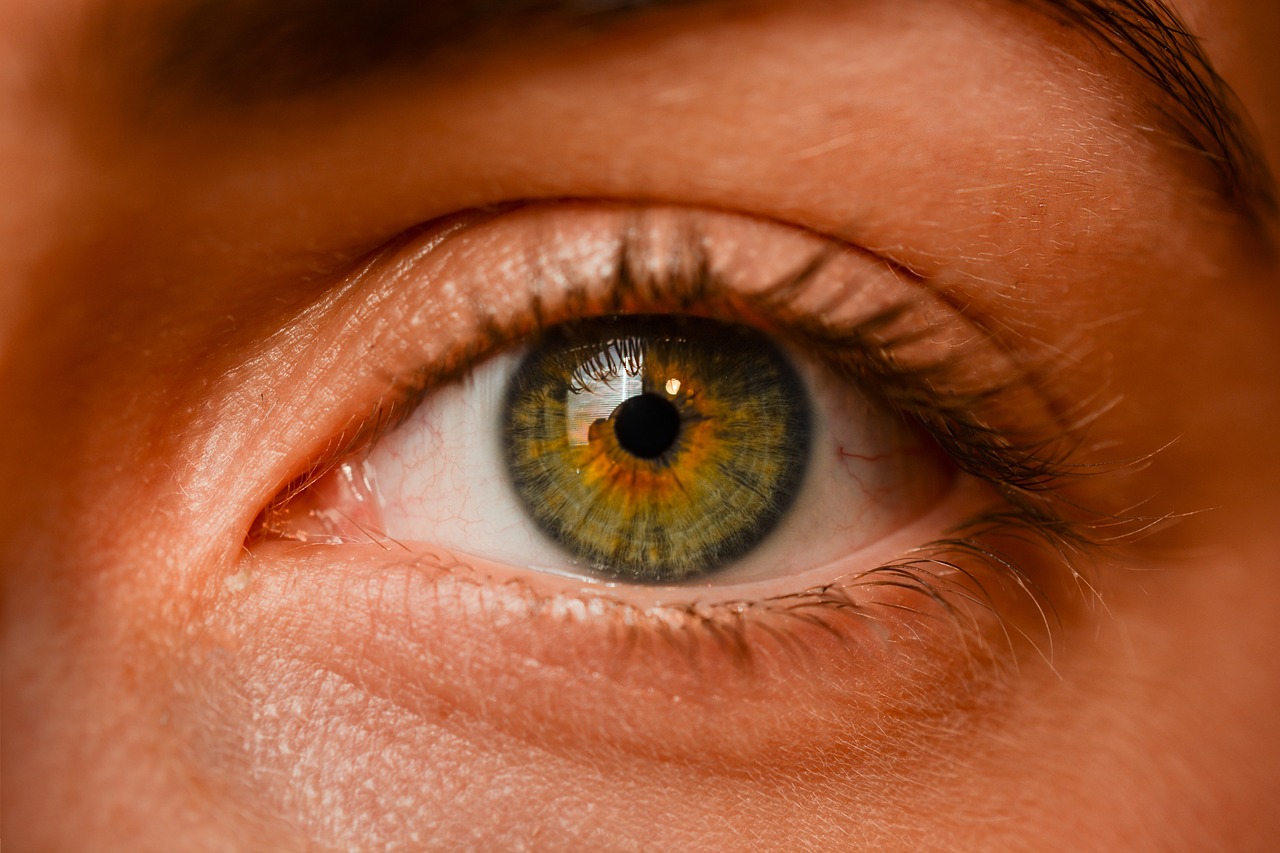
Preventive Care for Eye Health
When it comes to keeping your furry friend's eyes sparkling and healthy, preventive care is your best friend! Just like we humans need regular check-ups and a healthy diet to maintain our vision, our pets require the same level of attention. One of the most important aspects of preventive care is routine eye cleaning. By regularly checking and cleaning your pet's eyes, you can prevent the build-up of dirt and debris that can lead to irritation or infections. It's like giving their eyes a mini spa day!
So, how do you go about cleaning your pet's eyes safely? Start with a soft, damp cloth or a cotton ball. Gently wipe away any discharge or crust that may have accumulated around the eyes. Make sure to use a clean section of the cloth for each wipe to avoid spreading any potential infection. If you notice persistent discharge, it might be time to consult your veterinarian, as this could indicate a more serious issue.
Another key factor in maintaining eye health is proper nutrition. Just as a well-balanced diet is crucial for our overall health, it plays a significant role in our pets' eye health too. Nutrients like Omega-3 fatty acids, vitamin A, and antioxidants are essential for keeping their vision sharp. Incorporating foods rich in these nutrients into your pet's diet can make a world of difference. Think of it as feeding their eyes from the inside out!
It's also important to protect your pet's eyes from potential injuries. Whether it's a rambunctious play session with other pets or a simple outing in the park, consider using protective gear if your pet is prone to eye injuries. Dog goggles, for example, can be a fun and effective way to shield their eyes from harmful UV rays and debris. Just imagine how cool your pup will look sporting a pair of shades!
In summary, preventive care for your pet's eye health includes:
- Regular eye cleaning to remove debris
- A balanced diet rich in essential nutrients
- Protective measures against potential injuries
By taking these proactive steps, you can help ensure that your pet's eyes remain bright and healthy for years to come. Remember, an ounce of prevention is worth a pound of cure!
Q: How often should I clean my pet's eyes?
A: It's a good idea to check and clean your pet's eyes at least once a week or more frequently if you notice any discharge or irritation.
Q: What signs should I look for that indicate my pet may have eye issues?
A: Look out for symptoms like excessive tearing, squinting, redness, or changes in eye color. If you notice any of these signs, consult your veterinarian.
Q: Can my pet's diet really affect their eye health?
A: Absolutely! A diet rich in Omega-3 fatty acids, vitamins A, C, and E, and antioxidants can significantly contribute to maintaining good eye health.
Q: Are there any specific breeds that are more prone to eye problems?
A: Yes, certain breeds are more susceptible to eye issues due to their anatomy. Breeds like Bulldogs and Pugs often face more eye-related challenges, so extra care is needed.
Regular Eye Cleaning
Keeping your pet's eyes clean is not just a routine task; it's a critical aspect of their overall health. Just like humans, pets can accumulate dirt and debris around their eyes, which can lead to irritation or even infections if left unchecked. Regular eye cleaning can help prevent these issues and ensure your furry friend maintains clear and healthy vision. But how often should you clean your pet's eyes? The answer can vary based on the breed, age, and specific health needs of your pet. For instance, breeds with prominent eyes, like Pugs or Bulldogs, may require more frequent cleaning due to their anatomical structure.
To get started with regular eye cleaning, you'll need a few simple supplies: a clean, soft cloth or cotton balls, and a veterinarian-approved eye cleaning solution. It's essential to use products specifically formulated for pets, as human products can be too harsh and may cause more harm than good. Begin by gently moistening the cloth or cotton ball with the cleaning solution. Then, carefully wipe around your pet's eyes, removing any discharge or crust that may have built up. Always wipe from the corner of the eye outward to avoid pushing debris into the eye itself.
It's also important to monitor your pet's eyes during the cleaning process. Look for any signs of redness, swelling, or abnormal discharge. If you notice anything unusual, it may be time to consult your veterinarian. Regular cleaning not only helps remove dirt but also allows you to catch potential problems early on. So, think of it as a bonding experience; you're not just cleaning their eyes, you're also taking the time to check in on their health. Make it a part of your routine, and your pet will thank you with bright, healthy eyes!
- How often should I clean my pet's eyes? It varies, but generally, once a week is a good start. More frequent cleaning may be necessary for certain breeds.
- What should I use to clean my pet's eyes? Use a vet-recommended eye cleaning solution and a soft cloth or cotton balls.
- What if my pet resists eye cleaning? Be gentle and patient. You can try to make it a positive experience with treats and praise.
- When should I consult a veterinarian? If you notice persistent redness, swelling, or abnormal discharge, it's best to seek professional advice.
Nutrition for Eye Health
When it comes to maintaining your pet's eye health, nutrition plays a crucial role. Just like humans, pets require a balanced diet rich in essential nutrients to support their vision. A well-rounded diet can help prevent various eye problems and keep those adorable peepers sparkling and bright. So, what should you be looking for in your pet's food?
First and foremost, antioxidants are your pet's best friends! Nutrients like vitamins A, C, and E, along with beta-carotene, are known to combat oxidative stress. This stress can lead to age-related issues such as cataracts or other degenerative eye diseases. For instance, vitamin A is particularly important for maintaining a healthy retina and overall eye function. You can find these vitamins in various foods, including:
- Carrots
- Sweet potatoes
- Spinach
- Blueberries
Moreover, omega-3 fatty acids are essential for keeping your pet's eyes lubricated and reducing inflammation. These healthy fats can be found in fish oil, flaxseed, and certain types of algae. Incorporating these into your pet's diet can help maintain their eye moisture and reduce the risk of dry eye conditions.
Another important nutrient is zinc, which helps transport vitamin A from the liver to the retina. This is vital for the production of melanin, a pigment that protects the eyes from harmful light. Foods rich in zinc include:
- Beef
- Pumpkin seeds
- Chickpeas
It's also worth noting that hydration is key. Just like us, pets need to stay hydrated to keep their eyes moist and healthy. Ensure your furry friend has access to fresh water at all times, and consider incorporating wet food into their diet if they tend to be less inclined to drink.
When selecting a commercial pet food, always check the ingredient list. Look for high-quality proteins and whole food ingredients that are rich in the nutrients mentioned above. If you're unsure about your pet's diet, consult with your veterinarian to tailor a plan that meets their specific needs.
In summary, proper nutrition is a fundamental aspect of maintaining your pet's eye health. By providing a diet rich in antioxidants, omega-3 fatty acids, and zinc, you're not just feeding your pet; you're investing in their long-term vision and overall well-being. So, next time you fill their bowl, remember that what goes into their body is just as important as how much they eat!
Q: How can I tell if my pet's diet is affecting their eyes?
A: Look for signs such as excessive tearing, squinting, or changes in eye color. If you notice any of these symptoms, it may be time to evaluate their diet and consult with your veterinarian.
Q: Are there specific brands of pet food that are better for eye health?
A: While many brands offer high-quality nutrition, look for those that specifically mention eye health benefits and contain a balance of essential nutrients like antioxidants and omega-3 fatty acids.
Q: Can supplements help improve my pet's eye health?
A: Yes, certain supplements, especially those rich in omega-3 fatty acids or antioxidants, can be beneficial. However, it's best to consult your veterinarian before introducing any new supplements to your pet's diet.
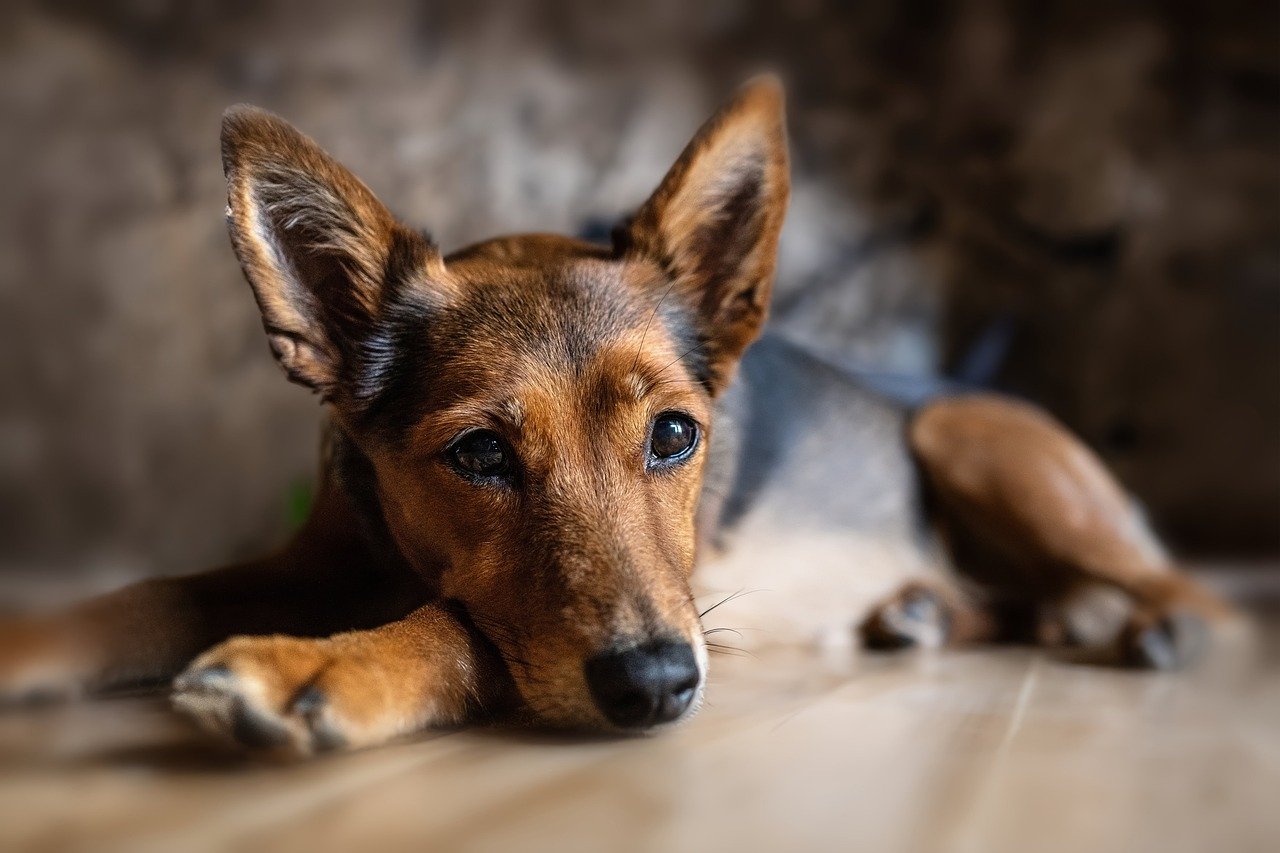
When to Visit the Veterinarian
Knowing when to seek veterinary care for your pet's eyes can be the difference between a minor issue and a serious condition. Just like we humans need to pay attention to our health, our furry friends also require vigilant observation. If you notice any unusual behavior or symptoms related to their eyes, it’s crucial to act promptly. Here are some key scenarios when you should definitely consider a trip to the vet:
- Persistent Tearing: If your pet is experiencing excessive tearing that doesn’t seem to improve, it could indicate an underlying issue that needs medical attention.
- Squinting or Excessive Blinking: If your pet is squinting more than usual or constantly blinking, they may be experiencing discomfort or pain in their eyes.
- Changes in Eye Color: Any noticeable changes in the color of your pet’s eyes, such as cloudiness or redness, should be evaluated by a veterinarian.
- Discharge: If you notice any unusual discharge, whether it's clear, yellow, or green, it’s a sign that something is wrong.
- Behavioral Changes: If your pet is acting differently, such as being less active or avoiding bright light, it could be a sign of eye problems.
These symptoms may seem minor at first, but they can escalate quickly, leading to more serious conditions if left untreated. For instance, cataracts can develop rapidly and lead to blindness if not addressed early. It’s important to remember that pets can’t tell us when something is wrong, so we must be their eyes and ears.
Additionally, regular veterinary check-ups are essential for maintaining your pet's overall health, including eye health. During these visits, your veterinarian can conduct a thorough examination of your pet’s eyes and identify any potential issues before they become severe. Think of it as a routine maintenance check for your furry friend; just like you wouldn’t skip an oil change for your car, you shouldn’t skip check-ups for your pet.
As a pet owner, being proactive about your pet’s eye health is crucial. If you’re ever in doubt or if something seems off, don’t hesitate to reach out to your veterinarian. It’s always better to be safe than sorry. Remember, your pet relies on you to keep them healthy and happy!
- How often should I take my pet to the vet for eye check-ups? It’s recommended to have your pet’s eyes checked at least once a year during their annual check-up, or more frequently if they have a history of eye problems.
- Can I use human eye drops on my pet? No, you should never use human eye drops on your pet without consulting your veterinarian, as they can contain ingredients that are harmful to animals.
- What should I do if my pet has an eye injury? If your pet has sustained an eye injury, it’s important to seek veterinary care immediately to prevent further damage.
Frequently Asked Questions
- What are the common signs that my pet may have eye problems?
Look out for symptoms such as excessive tearing, squinting, redness, or changes in eye color. If your pet seems to be rubbing their eyes frequently or showing signs of discomfort, it’s time to consult your vet.
- How can I keep my pet's eyes clean?
Regularly clean your pet's eyes with a damp, soft cloth. Use a separate cloth for each eye to avoid spreading any potential infections. Be gentle and make it a positive experience for your pet.
- What should I do if I notice excessive tearing in my pet?
Excessive tearing can be a sign of allergies, infections, or other underlying issues. It’s important to monitor your pet’s behavior and consult your veterinarian for an accurate diagnosis and appropriate treatment.
- Are there specific foods that can help improve my pet's eye health?
Yes! Foods rich in Omega-3 fatty acids, antioxidants, and vitamins A, C, and E can support your pet's eye health. Consider incorporating fish, carrots, and leafy greens into their diet.
- When should I take my pet to the veterinarian for eye issues?
If you notice any persistent symptoms like squinting, redness, or unusual discharge, it’s crucial to seek veterinary care. Early intervention can prevent more serious eye problems down the line.
- Can environmental factors affect my pet's eye health?
Absolutely! Dust, pollen, and smoke can irritate your pet's eyes. Limiting their exposure to these irritants and keeping your home clean can help maintain their eye health.
- Is it normal for pets to squint occasionally?
While occasional squinting can be normal, frequent squinting can indicate discomfort or pain. If your pet is squinting regularly, it's best to consult a veterinarian.




